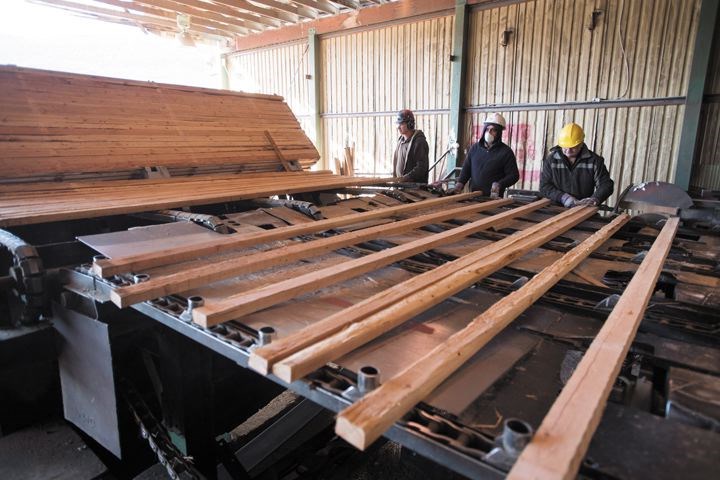The sight of the United Steelworkers international president standing next to U.S. president Donald Trump as he launched his attack on Canadian softwood lumber has become grist for an often-aired attack ad in which the B.C. Liberals question NDP leader John Horgan's motivation.
"Who's side is John Horgan on?" the voiceover asks after inferring a conspiracy connecting the appearance with the strong financial support the USW has given the New Democrats in B.C.
But as the old adage goes, appearances aren't always what they seem. Leo Gerard, the man who was standing next to Trump, has since issued a letter that opens this way: "No matter what side of the border I work on, more and more I hear from right-wing politicians who don't really have any ideas of their own so they just make things up. Apparently this B.C. election is no different.
"B.C. Liberal leader Christy Clark has falsely claimed that my meeting with U.S. President Donald Trump was about softwood lumber - she just made that up - in fact it was about protecting our members' jobs in the steel industry in both the U.S. and in Canada."
Indeed, Gerard was there April 20 to see Trump sign a memorandum directing the Department of Commerce to investigate the national security implications of importing foreign-made steel. Just prior to doing so, Trump made apparently off-the-cuff remarks not only about softwood but Canadian dairy and energy producers.
Gerard goes on to outline why the tarrifs could backfire for the U.S., claiming it will cost Americans 8,000 jobs in the construction industry alone due to the consequent higher cost of lumber. He also asserts Canadian lumber companies like West Fraser and Interfor "stand to benefit no matter what."
"They've taken profits from B.C. to buy mills in the US and hedge their bets. It's the small operators, the value added sector and, most importantly, our members and their communities that get hurt the most," Gerard said.
How fair that comment may be is a question for another day. The upshot is that Gerard clearly opposes Trump's action against Canadian softwood.
As for the USW's support of the NDP, which has extended to paying the salaries of the party's senior campaign staff and what the Liberals say was the largest contribution in a single year in B.C.'s history, USW District 3 president Stephen Hunt makes no bones about the moves.
"This is not a revelation," Hunt said in an interview. "We are one of the founders of the NDP so it shouldn't come as any surprise."
Hunt went on to question Clark's moves to stop U.S. thermal coal from being shipped out of B.C. ports in retaliation. Instead, he said a better move would be to ban the export of raw logs into the U.S., a proposal the NDP has emphasized throughout the campaign.
Coal or raw logs, Al Idiens a now-retired College of New Caledonia economics instructor, is leery of so-called "tit-for-tat" measures.
A better move, he said, is to go through the tribunal process, where the outcome has consistently been in Canada's favour and support the smaller producers with loan guarantees to offset the duties they will pay in the interim.
"That's where the problem comes in - it's the small producers because they don't have the cash flow," Idiens said. "Canfor and West Fraser do. They've got the cash and can hang on then hopefully win it back in arbitration."
As to whether banning raw log exports will bring back jobs, that's questionable, at least according to the Truck Loggers Association.
"While the forest industry may have lost 30,000 jobs in the last 15 years, it is definitely not because of log exports," TLA executive David Elstone said in a press release issued Tuesday. "It is because the working forest has shrunk dramatically in that time."
In the Interior, the mountain pine beetle is to blame. There are no longer enough full grown trees to support the Interior mills and so mills have and will continue to close, according to the TLA.
On the coast, the size of the working forest has fallen by a third since 1985 as "British Columbians worked to find a balance between environmental protection and a healthy forest industry."
"Simply put, it is wrong to say that mills have closed wholly as a result of log exports. Our sawmills and pulp mills have closed because we're harvesting a lot less trees than we used to," said Elstone.
"Any industry is affected by many variables. Markets and lack of certainty on the land base have also affected B.C.'s forest industry."
Some 65 per cent of logs harvested on the coast are processed in B.C, and the number rises to 90 per cent when the Interior is included, according to the TLA.



